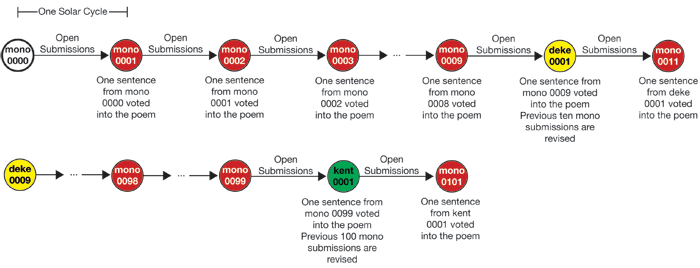Millennium Saga is a long term game design to draft a poem describing and spanning 1,000 years of history. The framework is to guide the participants into creating a collective work to be publicly performed as a form of oral history.
How To Play
Teams can consist of individuals or groups. They will come and go as individuals are born and die, organization will form, disappear and reform. Countries will exist and pass, therefore participation must also be flexible.
Multiple games can be occurring simultaneously, each with different topics, participants, and at different points in their 1,000 year lifespan.
Each turn is one solar cycle. In the 21st century this is referred to as 1 year or roughly 365.25 days. It is the time it takes for Earth to complete a single rotation around its star.
There would be small events every solar cycle called a “mono”, every tenth solar cycle there would be a larger recollecting event called a “deke”, every 100th solar cycle an event called a “kent”.
In total, there are 10 “kents”, 100 “dekes”, 1,000 “monos” and 1 grand finale to this 1,000 year game.
Inspired by an idea by Tollas Tibor while incarceration in a Hungarian prison trying to pass the time, I derived many of these ideas. In the camp, the prisoners rarely got to connect and chat, but all being intellectuals, they yearned for some discussion and stimulation. Therefore, they all decided to collectively write a translation of “O Captain! My Captain!”. It was the poem that most of them could recite by heart in English. Their task was to translate it, in secret. Since there was no paper, they devised an interesting way to communicate and try to solidify the process. In the first step they soaped-up the soles of their shoes in an attempt to “write” the English poem committing it, line by line, to memory. The other participants would discuss and vote, further modifying the work one line at a time. Once consensus was reached, that line was committed to memory and the process continued to the next. Doing this repeatedly kept the prisoners from going crazy because the game forced them to remember, create, think and collaborate.
My 1,000 year game works in a similar manner. I want to create an oral history which will be recited at the grand finale. It will encompass the path of humanity over the millennium.
During each “mono”, teams can optionally submit a stanza to the game. Which will be discussed for the next solar cycle. At the following event, a single submission from the previous “mono” is accepted into the oral saga and all new submissions are accepted and studied for the following solar cycle. At each “deke” the previous 10 “monos” submissions can be reworked, only “in spirit”. This is an opportunity to remove any dead language, terms which might have fallen out of favor, or other unforeseen issues.
The voting to bring in new “mono” lines will be limited to those that submitted in the previous “mono” (with the exception of the first year). At each “deke” a ceremony is held where all “monos” up to that point are recited orally in public from memory. A single common language will prevail in the poem. It will start in English, but at each “deke” it will be updated to reflect the language of the time and voted on.
At each “kent”, the previous 10 “dekes” can be reworked and voted. Again, a ceremony is held and the entire poem is recited publicly from memory recalling the history since the game began.
This is repeated 10 times. On the final “kent”, the grand finale, there will be 100 “deke”, which is 1,000 “mono” stanzas to recite publicly.
While it is to be committed to memory so that the knowledge will transcend any medium, now or in the future, it will obviously be transcribed for the purpose of studies in the intermediate time scales.
Anyone should be able to annotate the versions with footnotes, references, hyperlinks and yearly translations.
Since at “deke” and “kent” events, previous versions can be updated, by the grand finale, there could be up to 100 versions of the poem in various states of languages and revisions, but only one will be recited.
At each “mono” a new stanza is accepted by a contingent voting method where you create an ordered list based on your preference. The same methodology is used to accept any “deke” or “kent” revisions. If there is any sort of voting problem, a no vote or no submission, a suitable line of text should be inserted into the poem to let reads know there was an issue.
A method for “official” submissions is not described here, but must be as open as possible.
There is no “winner” in the conventional sense that another team loses. This game is designed to cooperate to create a saga of human history. The winners are the lost tribes, cities, people, ideas, geography, geology and creatures which have been immortalized in the poem.
In the end there will be 1,000 lines, making this a great feat of memory by normal 21st century standards.
Background
The challenge for this 1,000 year game design comes from Daniel Solis. You can read more about the rules and see other entries on his blog. For more background about the choices in the “Millennium Saga” game design, you can read them at http://optional.is/required/2011/08/22/1000-year-game-challenge/
